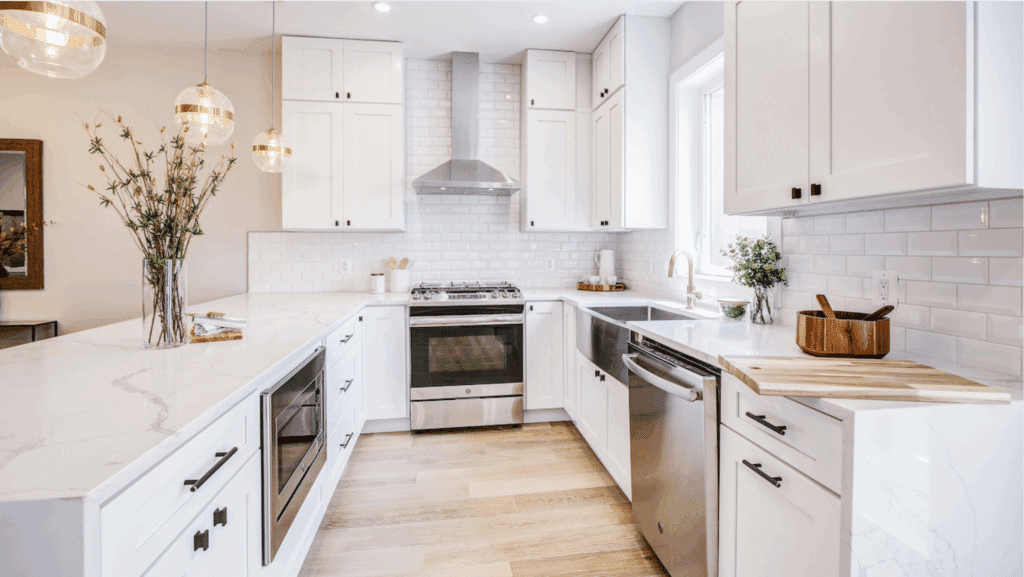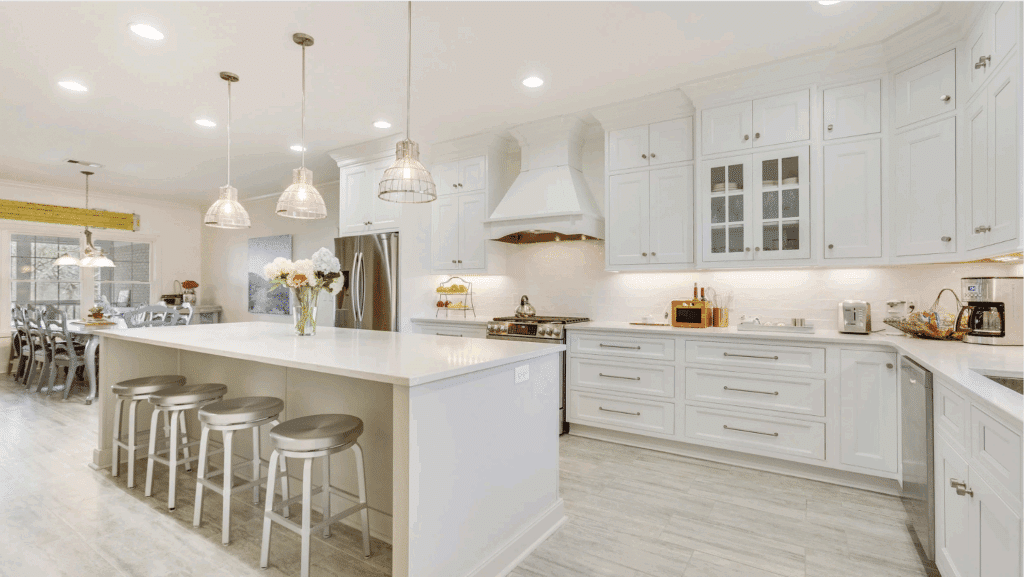When I first started looking into a kitchen remodel, I noticed that every website gave me a different “average” timeline.
Some said four weeks, others said three months, and a few even suggested it could take up to a year.
The truth is, there isn’t one simple answer, because every kitchen, budget, and situation is different.
A remodel can move quickly if you’re just updating cabinets or countertops, but it can drag on if you’re gutting the whole space or waiting on special materials.
What I really wanted to know was how long it took for real people in real situations.
Reading numbers on a chart didn’t help me imagine the mess, delays, or small victories that come with the process.
That’s why I turned to community discussions and personal stories. In this post, I’ll share those voices and experiences, so you can get a clearer picture too.
The Importance of a Kitchen Remodel Timeline

Kitchen remodel timelines matter because the kitchen is one of the most important spaces in a home.
When it’s out of use, even briefly, routines like cooking, eating, and family time become harder. Many families set up temporary solutions, like eating out or creating a small cooking area.
Knowing how long the remodel may take helps reduce stress and prepare for changes.
Timelines also affect cost; the longer a project runs, the more money it can require through labor, rentals, or repairs.
That’s why clear expectations are key. Official estimates help, but they don’t always match real life.
Many turn to community stories for honest timelines and lessons from real homeowners.
How Long Does a Kitchen Remodel Usually Take?
A kitchen remodel usually follows a few clear steps, from planning to finishing touches. Knowing the timeline helps set realistic expectations and prepare for delays.
Week 1–2: Planning
The planning stage is where the remodel really begins. During this time, the layout is designed, materials are chosen, and all supplies are ordered.
This step may also include meeting with contractors, setting a budget, and getting permits if needed.
Planning usually takes one to two weeks, but it can stretch longer if special items, like custom cabinets, are chosen.
Week 3: Demolition
Demolition is the step where the old kitchen is cleared out. Cabinets, countertops, flooring, and sometimes walls are removed to make space for the new design.
This stage often goes quickly, usually about a week, but it can cause surprises like plumbing or wiring problems hidden behind walls.
These issues may add extra time and cost. While it can feel messy and noisy, demolition is an exciting part of the process because it shows the first big change in the kitchen.
Week 4–8: Installation
Installation is the largest phase and often takes four to five weeks. New cabinets are installed first, followed by countertops, flooring, lighting, and appliances.
This stage requires careful work because everything must be fitted correctly. Sometimes, delays happen if materials arrive late or if adjustments are needed.
Even though this part feels long, it’s where the kitchen begins to look brand new. Each week brings visible progress, making it one of the most rewarding steps in the remodel.
Week 9–12: Finishing
The finishing stage adds the final touches to the remodel. This includes painting, installing a backsplash, adding trim, and fixing any small details.
While these steps seem minor, they make a big difference in the overall look of the kitchen. This phase usually lasts a few weeks, but sometimes it can be quicker if the project is small.
The finishing stage is also when contractors check everything works correctly, leaving homeowners with a polished, ready-to-use kitchen space.
Community Experiences: What Homeowners Shared
Every kitchen remodel tells a different story, ranging from quick updates to long projects. Hearing from real homeowners gives a clearer picture of the challenges along the way.
1. What Affects the Timeline of Your Kitchen Remodel
“You can expect that the kitchen remodel is going to take anywhere from three months to a year depending on what you have done, how much you have done, and what kind of cabinets/countertops/flooring, etc. that you are going to choose. Installation is usually pretty quick once materials arrive, but everything depends on manufacturers’ timelines.”
2. Common Delays in Kitchen Remodels and Avoiding Them
“The kitchen remodel took longer than expected, mostly due to delays in countertop installation and scheduling issues with contractors. Planning ahead and being decisive with material choices really helps keep things on track.”
3. Breaking Down the Kitchen Remodel Timeline
“Planning and design took around 4 weeks, demolition and rough-ins took another 3 weeks, and the installation of cabinets, countertops, and final touches stretched over 4 weeks. Expect some surprises along the way and build some cushion into your timeline.”
4. How Flexibility in Your Remodel Timeline Can Reduce Stress
“Delays are common in remodeling projects. Building flexibility into your timeline and budget can reduce stress. Open communication with contractors helps solve problems quickly.”
5. Realistic Expectations for a Full Kitchen Remodel
“A full kitchen remodel will take at least 4–8 weeks of construction plus 2–3 months of prep. The key is to plan carefully and be prepared for unexpected snags to avoid major headaches.”
Factors That Affect Remodel Duration
Many things can change how long a kitchen remodel takes. From project size to hidden problems, these factors often decide if the work is quick or takes much longer.
- Project size: Small updates are fast, big remodels take longer.
- DIY vs. contractor: Doing it yourself is slower; contractors finish quicker.
- Material availability: If cabinets or appliances arrive late, work slows down.
- Unexpected issues: Hidden plumbing or wiring problems can add weeks.
- Permit approvals: Getting city permits often takes extra time.
- Design changes: Changing plans in the middle slows things down.
- Contractor schedule: Busy workers may take breaks between jobs.
- Weather conditions: Rain or snow can delay outdoor work.
- Budget limits: Running low on money can stop progress.
- Inspection delays: Waiting for approval can hold up the next step.
Kitchen Remodel Tips From Real Experiences
Homeowners who have gone through a kitchen remodel share advice that makes the process easier. Their tips come from real experiences and can help others avoid common problems.
- Plan extra buffer time: Remodels often last longer than planned. “We thought 8 weeks, but it took 12.”
- Talk clearly with contractors: Clear talks keep work on track. “Weekly check-ins made things smoother.”
- Order materials early: Late deliveries can stop progress. “Cabinets came 6 weeks late and delayed us.”
- Be ready for daily changes: No kitchen means adjusting. “We cooked in the garage during the remodel.”
- Set a clear budget: Costs can rise fast. “We added 15% more just in case, and needed it.”
- Check work often: Catching small issues early saves time. “I noticed a wrong tile and they fixed it quickly.”
- Have a backup plan for meals: Eating out gets tiring. “We bought a slow cooker to make life easier.”
- Stay patient: Remodels can be stressful. “It felt endless, but worth it in the end.”
Conclusion
After going through all these stories and tips, one thing is very clear to me: kitchen remodel timelines are never the same for everyone.
Some people finish in just a few weeks, while others spend months waiting for materials or fixing surprise problems.
There isn’t a single “right” answer, and that’s what makes hearing from real homeowners so helpful.
It’s smart to order things early, talk often with contractors, and always leave extra time in the schedule.
Even with the best plan, delays can happen, and that’s normal. Reading community experiences gave me a much better idea of what to expect compared to just looking at “average numbers.”
Now, I’d love to hear from you.
How long did your remodel take? Was it faster or slower than you thought? Share your story below. I know others will find it just as helpful as I did.

